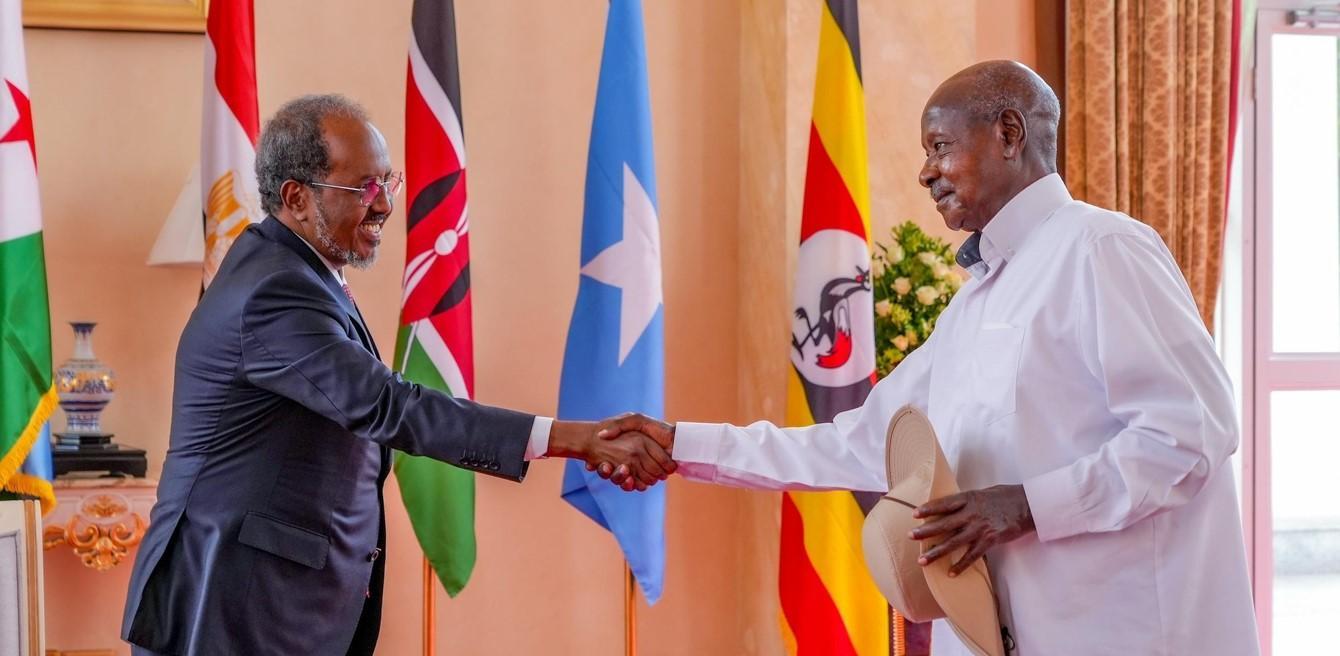By Faridah N Kulumba
Africa-Press – Uganda. On April 5, 2025, Somalia’s President Hassan Sheikh Mohamud arrived in Uganda for security-focused talks with his Ugandan counterpart, H.E. Yoweri Kaguta Museveni.
According to a statement from the Somali presidency, the discussions between the two East African leaders focused on cooperation in combating armed groups.
Strengthening Bilateral Ties
President Mohamud’s official visit aimed to reinforce bilateral relations and advance security cooperation against terrorist groups active in the Horn of Africa.
A key outcome of the meeting was joint support for the launch of the new African Union-led mission, AUSSOM, which is designed to enhance peace and security in Somalia. Both leaders emphasized the urgency of increasing international backing for Somalia’s Security Sector Reform Plan and strengthening the Somali National Armed Forces.
Frequent High-Level Engagements
This visit marked President Mohamud’s second trip to Uganda within two months. In February 2025, he met with President Museveni for “high-level” discussions.
During the February talks, Museveni praised the strong bilateral relationship and growing cooperation between the two nations. The leaders also revisited issues discussed during Mohamud’s previous visit to Uganda in October 2024, covering bilateral, regional, and global matters of mutual interest.
They exchanged views on the security situation in Somalia and the broader region, emphasizing the need to maintain peace and stability in the Horn of Africa and across the continent.
Tributes were paid to the Troop and Police Contributing Countries (T/PCCs) of the AU Mission in Somalia (AMISOM), as well as the Somali Security Forces, for their sacrifices in fighting al-Shabaab since 2007.
Uganda’s Role in Somalia
Uganda remains one of Somalia’s closest military allies, having deployed troops under the African Union Transition Mission in Somalia (ATMIS) to fight al-Shabaab, support stabilization efforts, and assist in rebuilding Somalia’s national army.
Deepening Security Cooperation
Recently, the governments of Uganda and Somalia signed a joint communiqué to enhance defense cooperation. The signing took place at Uganda’s Ministry of Defence and Veteran Affairs (MODVA) headquarters in Kampala, during a meeting between Hon. Jacob Oboth Oboth, Uganda’s Minister of Defence, and his Somali counterpart, H.E. Abdulkadir Mohamed Nur.
Earlier in November 2024, both nations reaffirmed their commitment to strengthening diplomatic ties and deepening collaborative security efforts.
This followed another meeting between Oboth and Minister Nur at Serena Hotel in Kampala. The agreement built upon discussions initiated by Presidents Museveni and Mohamud during their October 2024 summit in Kampala.
During the November meeting, Minister Abdulkadir commended the Uganda People’s Defence Forces (UPDF) for their pivotal role in Somalia, noting that their presence has contributed to regional stability and supported education and community development efforts.
Uganda was the first country to deploy troops to Somalia in 2007 under AMISOM. Its involvement paved the way for other African countries—including Djibouti, Kenya, and Ethiopia—to join the mission, which was initially met with skepticism before gaining momentum through UPDF’s leadership.
Transition to ATMIS
In March 2022, the African Union’s Peace and Security Council issued a communiqué outlining the mandate of the African Transition Mission in Somalia (ATMIS), which replaced AMISOM. The new mission aims to continue combating al-Shabaab and building the capacity of Somali Armed Forces to take over security responsibilities.
Al-Shabaab has been engaged in insurgency operations since 2006, aiming to overthrow Somalia’s internationally backed government and impose its own strict interpretation of Islamic law.
In May 2023, more than 50 Ugandan soldiers were killed by al-Shabaab in Somalia. The incident sparked criticism from Ugandan opposition figures, who questioned the benefits of UPDF’s continued presence and urged for the withdrawal of remaining troops.
However, Maj. Gen. (Rtd) Nathan Mugisha, Uganda’s Deputy Ambassador to Somalia, stated that the incident would not deter Uganda’s mission. He reiterated their commitment to supporting the Federal Government of Somalia, the Somali National Army, and the broader stabilization process to enable lasting peace and development.
Ongoing Insecurity
Coinciding with President Mohamud’s arrival in Uganda, a senior Somali military commander was killed while addressing troops.
Colonel Nur Farey, commander of the 14th October Brigade, was shot and killed by an assailant wearing a military uniform in the Addow Dibille area near Afgoye town, in the Lower Shabelle region. Eyewitnesses reported that the attacker approached Farey and opened fire, fatally wounding him.
Somali authorities have launched an investigation to determine whether the killer was an infiltrator from al-Shabaab.
Colonel Farey had been leading operations to retake Awdhegle town from al-Shabaab.
The 14th October Brigade was formed in memory of the victims of the deadliest terrorist attack in African history, which took place at Mogadishu’s K-5 junction on October 14, 2017, leaving over 1,000 people dead or injured.
The brigade continues to spearhead operations aimed at recapturing towns under al-Shabaab’s control in the Lower Shabelle region.
For More News And Analysis About Uganda Follow Africa-Press






